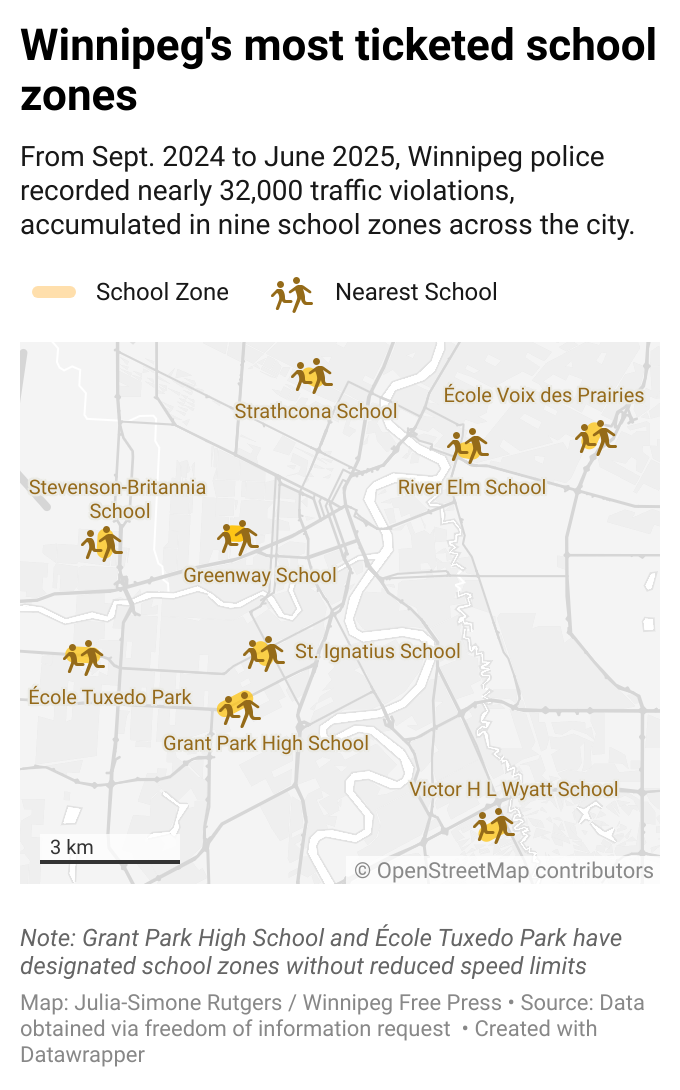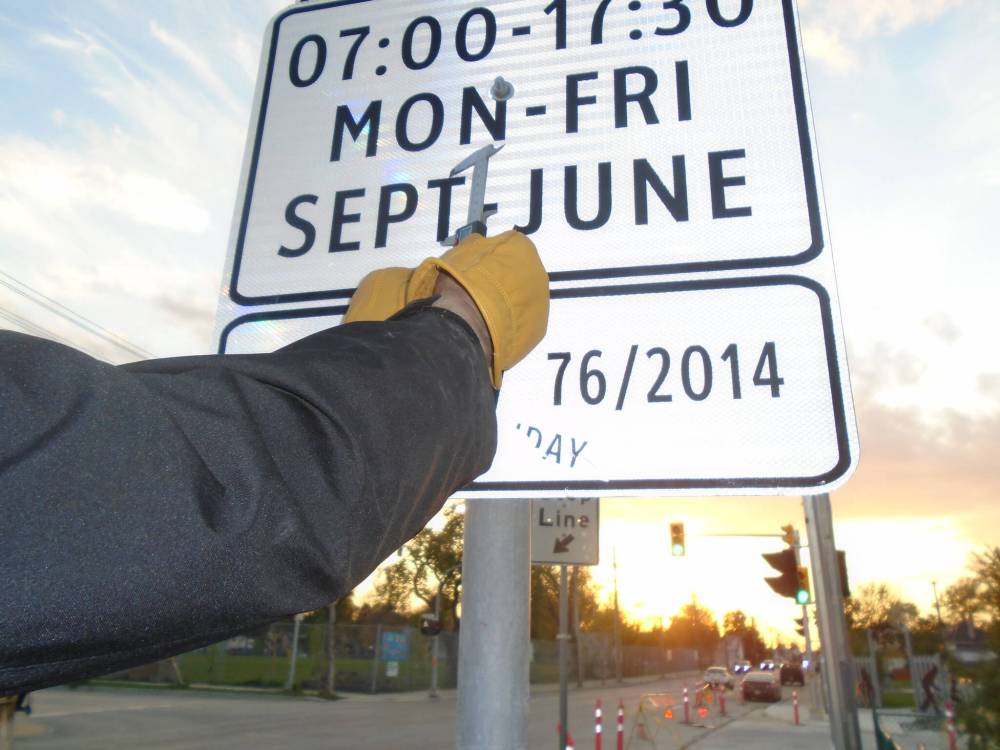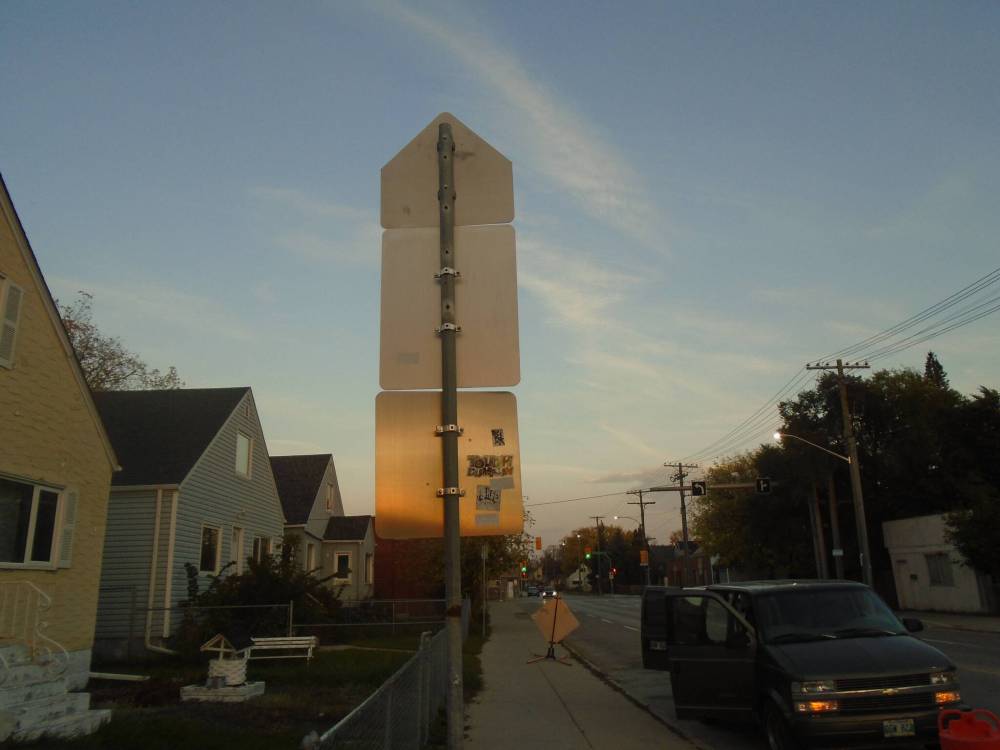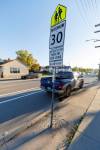Improper signage, absence of warning lights show school zones aren’t about safety, critics argue
Read this article for free:
or
Already have an account? Log in here »
To continue reading, please subscribe:
Monthly Digital Subscription
$1 per week for 24 weeks*
- Enjoy unlimited reading on winnipegfreepress.com
- Read the E-Edition, our digital replica newspaper
- Access News Break, our award-winning app
- Play interactive puzzles
*Billed as $4.00 plus GST every four weeks. After 24 weeks, price increases to the regular rate of $19.00 plus GST every four weeks. Offer available to new and qualified returning subscribers only. Cancel any time.
Monthly Digital Subscription
$4.75/week*
- Enjoy unlimited reading on winnipegfreepress.com
- Read the E-Edition, our digital replica newspaper
- Access News Break, our award-winning app
- Play interactive puzzles
*Billed as $19 plus GST every four weeks. Cancel any time.
To continue reading, please subscribe:
Add Winnipeg Free Press access to your Brandon Sun subscription for only
$1 for the first 4 weeks*
*$1 will be added to your next bill. After your 4 weeks access is complete your rate will increase by $0.00 a X percent off the regular rate.
Read unlimited articles for free today:
or
Already have an account? Log in here »
Calvin Kendall left provincial traffic court Thursday with a “$0 fine” and a written warning.
“I may be crazy, but I’m not stupid,” the 69-year-old said in a waiting room at 373 Broadway hours earlier while sorting through a USB stick of photo evidence and other items as he prepared to fight a $272 speed-camera ticket.
“There’s a method to my madness.”

Indeed, that method — and his evidence — resulted in the judgment later in the afternoon that he was guilty, with extenuating circumstances.
Kendall was one of the 5,664 drivers caught speeding in the 30 km/h zone in place to protect Greenway School in 2024-2025.
A flash went off at 9:39 a.m. on Oct. 23, 2024, when he was driving 47 km/h after turning right onto the thoroughfare from a back lane in the West End.
St. Matthews Avenue is the only street that accounted for two distinct spots on the Winnipeg Police Service list of its most-ticketed school zones between Sept. 1, 2024, and June 30.
Ahead of launching a new school-year series encompassing stories on commuter-safety concerns, the Free Press obtained traffic enforcement data through a $1,200 freedom of information request.
The No. 1 hot spot was behind River Elm School: eastbound Talbot Avenue, between Watt Street and Elmwood Road.
Eastbound and westbound traffic north of the fenced-in elementary school playground located at 390 Burnell St. are both listed in the Top 10 most-ticketed zones — at No. 3 and No. 8, respectively.
Kendall admits that he was, in fact, going 17 km/h above a reduced-speed school zone limit.
However, the Tyndall Park resident defended the traffic violation that he said occurred after picking up a free item that someone who lives in the area, which was unfamiliar to him, posted on “good ’ol Kijiji.”
The Free Press retraced Kendall’s route to fact-check the retiree’s concerns about poor signage putting students at risk. Westbound travellers are not greeted with a 30 km/h sign if they repeat his exact path.
“How can I be responsible for breaking a law I’m not aware of?” he said Thursday.
He visited the crime scene on the eve of his court date to check if all the signs in the area were up to provincial and municipal standards. They weren’t.
Anti-photo radar activist Todd Dube has endorsed the Ontario government’s newly unveiled plan to ban speed cameras in that province.
“If you want to be as honest as Doug Ford and call it what it is, you would call it the simple, tired old term: ‘a cash grab,’” said Dube, who has been calling on leaders in his hometown to dismantle photo-radar since the early 2000s.

Dube co-founded WiseUp Winnipeg in 2006 with Larry Stefaniuk who, at the time, was a newly retired traffic-enforcement officer.
In Dube’s words, he and Stefaniuk, who no longer lives in the city, joined forces over their shared interest: holding public servants accountable.
The University of Winnipeg’s Curtis Pankratz, a traffic-safety researcher and sociologist, has found that police generate about $4 million from photo enforcement speeding tickets in an average month.
“To say that people are dangerous speeders in school zones is a manufactured result of a problem that is fixed, literally, with flashing lights.”
The “best catch” for police is on holidays and when there’s no school, Dube said, drawing on 20 years of grassroots research and advocacy.
“People see no cars, no kids, no lights,” he said, noting there are many quick fixes if the city really cares about the safety of children and other community members who travel on foot or wheels of all kinds.
“To say that people are dangerous speeders in school zones is a manufactured result of a problem that is fixed, literally, with flashing lights.”
Five years ago, a local businessman who wanted to donate and install flashing amber lights in all school zones — at no charge — withdrew his offer, citing bureaucratic red tape.
“It’s become obvious to me that the councillors and the mayor do not care about child safety,” Chuck Lewis, owner of Expert Electric, told the Free Press in September 2020.
Lewis said it had become obvious to him that photo-radar cameras generate significant revenue, so elected officials were stalling.
Mayor Scott Gillingham was council’s finance chair, as well as the elected representative for St. James, when Lewis entered a preliminary agreement with the city. Gillingham resigned as chair of that committee in 2022 before launching his mayoral campaign.
The office of provincial Transportation Minister Lisa Naylor declined an interview.
The MLA for Wolseley, which encompasses Greenway School, did not provide a direct answer to any of the written questions submitted by the Free Press Thursday afternoon.
In a generic statement, Naylor said the province sets clear safety standards under the Highway Traffic Act and “ensures photo enforcement is used first and foremost to protect children.”

Coun. Cindy Gilroy (Daniel McIntyre) has acknowledged there are numerous quick fixes that could make Greenway School safer, such as adjusting signage so motorists driving eastbound on St. Matthews don’t miss it when they have to squint while driving directly into the morning sun.
Kendall, 69, learned how to drive both a tractor and a pickup truck before his first double-digit birthday.
“Farm kids grow up fast,” he said, recalling his upbringing in Starbuck, a 45-minute drive southwest of Winnipeg.
When the now-retiree was in his early 20s, he taught in-class defensive driving lessons at the Manitoba Safety Council (now known as Safety Services Manitoba).
He is a vocal opponent of Winnipeg’s status-quo school zones due to their ineffectiveness in reducing speeding — something that has repeatedly been proven by U of W’s Pankratz.
The sociologist’s team is waiting for publication of its latest research, which shows motorists drive much slower in school zones during instructional hours than they do otherwise. It is currently under review.
If reduced-speed school zones must exist then they should be intact 24-7, 365 days a year, Kendall said.
“The subconscious mind is not keeping track of time,” he said, citing his psychology 101 knowledge as a former philosophy student at the University of Manitoba. “These variable speed zones do not reinforce habits. They can’t.”
Two of the 10 people waiting to present their cases at traffic court outside a hearing Thursday afternoon were there because of a school-zone ticket.
One young man disclosed that he was accused of speeding on Talbot Avenue, east of Watt Street. The other motorist was Kendall.
maggie.macintosh@freepress.mb.ca

Maggie Macintosh
Education reporter
Maggie Macintosh reports on education for the Free Press. Originally from Hamilton, Ont., she first reported for the Free Press in 2017. Read more about Maggie.
Funding for the Free Press education reporter comes from the Government of Canada through the Local Journalism Initiative.
Every piece of reporting Maggie produces is reviewed by an editing team before it is posted online or published in print — part of the Free Press‘s tradition, since 1872, of producing reliable independent journalism. Read more about Free Press’s history and mandate, and learn how our newsroom operates.
Our newsroom depends on a growing audience of readers to power our journalism. If you are not a paid reader, please consider becoming a subscriber.
Our newsroom depends on its audience of readers to power our journalism. Thank you for your support.


